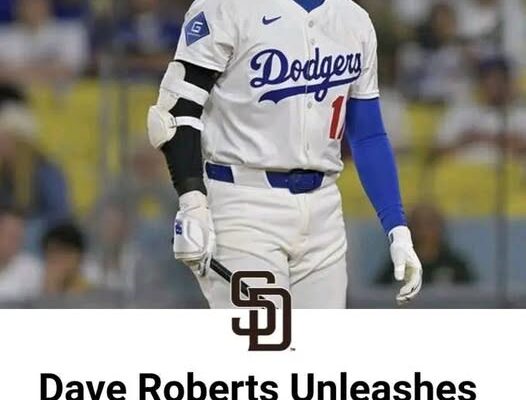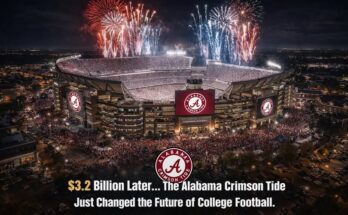The atmosphere was thick with tension the moment Shohei Ohtani took the mound on that fateful evening, but what no one could have anticipated was the eruption that would follow after Ohtani was plunked by a pitch from the San Diego Padres. The incident quickly escalated beyond a simple baseball play into a heated confrontation, with Dodgers manager Dave Roberts unleashing a torrent of frustration and anger directed squarely at the Padres organization. The aftermath of that event spiraled into an intense post-game showdown that dominated headlines and set the tone for a rivalry already simmering under the surface.
The incident itself was a flashpoint that ignited a deeper conflict rooted in both teams’ competitive spirit and mutual disdain. Ohtani, one of the most electrifying players in Major League Baseball, had been the focal point throughout the season, dazzling fans with his rare two-way prowess as both a pitcher and a hitter. The Padres, keenly aware of Ohtani’s game-changing abilities, appeared to have sent a message with the pitch that struck him—a pitch that many saw as intentional. The timing and placement of the throw, delivered with precision and seeming intent, caused an uproar among Dodgers players and staff, who interpreted the plunking as an unacceptable provocation.
Dave Roberts, known for his usually calm and collected demeanor, broke character in the aftermath of the incident. His reaction was immediate and vehement, venting his displeasure during post-game interviews and press conferences. Roberts didn’t mince words, accusing the Padres of unsportsmanlike behavior and deliberately trying to intimidate Ohtani and the Dodgers. His comments made it clear that he saw this as more than just a routine part of baseball’s unwritten rules—it was an act that crossed a line and demanded a response.
The emotional intensity of Roberts’ tirade reflected not only his role as a leader responsible for defending his players but also the high stakes involved in this heated rivalry. The Dodgers and Padres have always had a competitive edge between them, with both teams vying for dominance in the National League West. Yet, this incident threatened to turn their contests into a full-blown feud, complete with possible retaliations and on-field confrontations. Roberts’ public rebuke was a clear signal that the Dodgers would not stand idly by while one of their stars was targeted in such a way.
The timing of the hit-by-pitch incident couldn’t have been worse for the Padres, who were already under intense scrutiny for their aggressive style of play. Their pitchers had developed a reputation for pitching inside and using intimidation tactics, which often walk a fine line between competitive strategy and dangerous behavior. Critics and analysts weighed in, debating whether the pitch that hit Ohtani was a calculated move or a reckless mistake. However, the consensus seemed to lean toward the former, given the circumstances and the buildup of tension throughout the game.
Ohtani himself responded with remarkable composure, refusing to let the incident derail his focus or affect his performance. His resilience in the face of adversity only added to his stature as one of the game’s most admired figures. Teammates rallied around him, visibly energized by his grit and determination. This unity further fueled Roberts’ passion and underscored his responsibility as a manager to protect his players both on and off the field.
As media coverage intensified, the narrative quickly shifted from a single pitch to a broader discussion about the culture of baseball and the responsibilities players and teams have toward one another. Fans and commentators debated the unwritten codes of conduct and whether they still had a place in the modern game. Roberts’ fiery comments contributed significantly to this conversation, highlighting the evolving nature of baseball where safety and sportsmanship increasingly take precedence over archaic traditions.
The post-game showdown didn’t end with words alone. The dugouts remained charged with tension long after the final out, with several close calls and aggressive plays serving as reminders that the underlying animosity was far from resolved. On the field, the Dodgers played with a renewed sense of urgency, determined to send a message back to the Padres. Meanwhile, Padres players and coaches appeared defiant, refusing to back down or apologize, which only added fuel to the fire.
In interviews following the game, Roberts elaborated on his perspective, emphasizing that the plunking of Ohtani was an unacceptable provocation that threatened the integrity of the game. He spoke passionately about the importance of protecting star players who bring excitement and attention to baseball, underscoring the responsibility teams have to uphold respect and fairness. His statements resonated with many fans who saw the incident as a symptom of deeper issues within the sport.
Baseball analysts took note of Roberts’ outburst, dissecting its implications for team dynamics and league relations. Some praised Roberts for standing up firmly for his players, while others cautioned that such confrontations risk escalating tensions unnecessarily. The debate highlighted the delicate balance managers must strike between advocating for their team and maintaining professionalism in a highly scrutinized environment.
Amidst all the drama, Ohtani’s performance remained a bright spot for the Dodgers. His ability to channel the adversity into focus and excellence became a rallying point for the team and their supporters. Every at-bat and inning pitched carried an added layer of significance, symbolizing resilience in the face of provocation. This narrative added a compelling dimension to the ongoing rivalry, raising the stakes for future matchups between the Dodgers and Padres.
The fallout from the incident reached beyond just the teams involved. Major League Baseball officials found themselves under pressure to address the underlying causes of such confrontations and prevent future incidents. Discussions around rules enforcement, player safety protocols, and the role of umpires in managing tensions came to the forefront. Roberts’ vocal stance contributed to a growing call for the league to take stronger action in protecting players from dangerous pitches and maintaining a respectful playing environment.
Social media exploded with reactions from fans and former players, many of whom expressed solidarity with Roberts and Ohtani. The incident became a trending topic, sparking debates on forums, podcasts, and sports talk shows. Supporters praised Roberts for his leadership and defense of his team, while critics argued about the appropriateness of such public criticisms. The widespread attention underscored the impact that a single moment on the field can have on the broader sports community.
As the dust settled, both teams prepared for the next encounter, aware that the rivalry had reached a new level of intensity. The incident involving Ohtani and the Padres would be remembered as a defining moment in the season, shaping how players, coaches, and fans approached the game going forward. For Dave Roberts, the episode reaffirmed his commitment to his players and his willingness to confront challenges head-on, no matter the consequences.
Looking back, this dramatic episode highlighted several key themes in contemporary baseball—the balance between competition and sportsmanship, the evolving role of managers as protectors and spokespersons, and the importance of player safety in a high-stakes environment. Roberts’ eruption was more than just a managerial outburst; it was a catalyst for important conversations about respect, rivalry, and responsibility within the sport.
In conclusion, Dave Roberts’ fiery reaction to the Padres’ plunking of Shohei Ohtani was a pivotal moment that transcended the game itself. It sparked an intense post-game showdown and brought to light the tensions simmering between two competitive teams. Roberts’ passionate defense of his star player and his willingness to publicly confront the Padres highlighted the emotional and strategic complexities of managing in today’s MLB. The incident served as a reminder that baseball is not just a game of statistics and scores but also a battleground of pride, passion, and principle. As the season progressed, the Dodgers and Padres would carry the weight of this confrontation with them, adding an extra layer of drama to every pitch, every swing, and every moment on the diamond.



